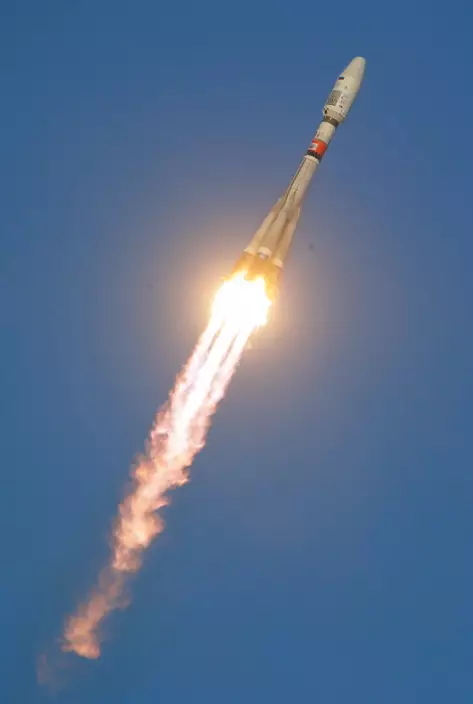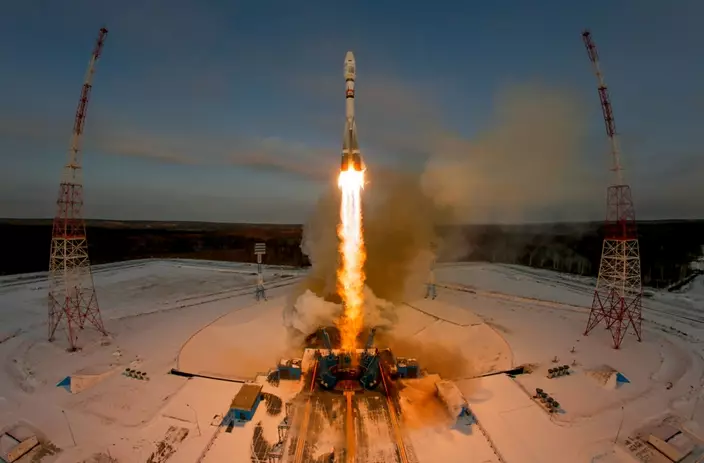Russia's latest space launch failures have prompted authorities to take a closer look into the nation's struggling space industry, the Kremlin said Thursday.

FILE - In this Tuesday, Nov. 28, 2017 file photo, a Russian Soyuz 2.1b rocket carrying Meteor M satellite and additional 18 small satellites, flies in the sky at the new Vostochny cosmodrome outside the city of Tsiolkovsky, about 200 kilometers (125 miles) from the city of Blagoveshchensk in the far eastern Amur region, Russia.(AP Photo/Dmitri Lovetsky, File)
A Russian weather satellite and nearly 20 micro-satellites from other nations were lost following a failed launch from Russia's new cosmodrome in the Far East on Nov. 28. And in another blow to the Russian space industry, communications with a Russian-built communications satellite for Angola, the African nation's first space vehicle, were lost following its launch on Tuesday.
Asked about the failures, President Vladimir Putin's spokesman, Dmitry Peskov, said Thursday that authorities warrant a thorough analysis of the situation in the space industry.
Amid the failures, Russian officials have engaged in a round of finger-pointing.

FILE - In this Tuesday, Nov. 28, 2017 file photo, a Russian Soyuz 2.1b rocket carrying the Meteor M satellite and additional 18 small satellites lifts off from the launch pad at the new Vostochny cosmodrome outside the city of Tsiolkovsky, about 200 kilometers (125 miles) from the city of Blagoveshchensk in the far eastern Amur region, Russia.(AP Photo/Dmitri Lovetsky, File)
Deputy Prime Minister Dmitry Rogozin, who oversees Russia's military industrial complex and space industries, said in a television interview Wednesday that the Nov. 28 launch from the new Vostochny launch pad in Russia's Far East failed because the rocket had been programmed to blastoff from the Russia-leased Baikonur launch pad in Kazakhstan instead of Vostochny. He accused the Russian space agency Roscosmos of "systemic management mistakes."
Roscosmos fired back Thursday, dismissing Rogozin's claim of the flawed programming. It did acknowledge some shortcomings that led to the launch failure and said a number of officials were reprimanded.
Rogozin quickly riposted on Facebook, charging that Roscosmos was "trying to prove that failures occur not because of mistakes in management but just due to some 'circumstances.'"
The cause of the failure of the Angolan satellite hasn't been determined yet. Communications with the satellite, which was built by the Russian RKK Energia company, a leading spacecraft manufacturer, were lost after it entered a designated orbit.
Russia has continued to rely on Soviet-designed booster rockets to launching commercial satellites, as well as crews and cargo to the International Space Station. A trio of astronauts from Russia, Japan and the United States arrived at the space outpost last week following their launch from Baikonur.
While Russian rockets have established a stellar reputation for their reliability, a string of failed launches in recent years has called into question Russia's ability to maintain the same high standards for manufacturing space equipment.
Glitches found in Russia's Proton and Soyuz rockets in 2016 were traced to manufacturing flaws at the plant in Voronezh. Roscosmos sent more than 70 rocket engines back to production lines to replace faulty components, a move that resulted in a yearlong break in Proton launches.
The suspension badly dented the nation's niche in the global market for commercial satellite launches. Last year, Russia for the first time fell behind both the U.S. and China in the number of launches.
While Russia plans to continue to use Baikonur for most of its space launches, it has poured billions of dollars in to build the new Vostochny launch pad. A launch pad for Soyuz finally opened in 2016, but another one for the heavier Angara rockets is only set to be completed in late 2021 and its future remains unclear, drawing questions about the feasibility of the expensive project.
Work at Vostochny also has been dogged by scandals involving protests by unpaid workers and the arrests of construction officials accused of embezzlement.
BOGOTA, Colombia (AP) — Colombia has become the latest Latin American country to announce it will break diplomatic relations with Israel over its military campaign in Gaza, but the repercussions for the South American nation could be broader than for other countries due to longstanding bilateral agreements over security matters.
Colombian President Gustavo Petro on Wednesday described Israel’s actions in Gaza as “genocide” and announced his government would end diplomatic relations with Israel effective Thursday. But he did not address how his decision could affect Colombia’s military, which uses Israeli-built warplanes and machine guns to fight drug cartels and rebel groups, and a free trade agreement between both countries that went into effect in 2020.
Also in the region, Bolivia and Belize have also severed diplomatic relations with Israel over the Israel-Hamas war.
Here’s a look at Colombia's close Israel ties and fallout:
Colombia and Israel have signed dozens of agreements on wide-ranging issues, including education and trade, since they established diplomatic relations in 1957. But nothing links them closer than military contracts.
Colombia’s fighter jets are all Israeli-built. The more than 20 Kfir Israeli-made fighter jets were used by its air force in numerous attacks on remote guerrilla camps that debilitated the Revolutionary Armed Forces of Colombia. The attacks helped push the rebel group into peace talks that resulted in its disarmament in 2016.
But the fleet, purchased in the late 1980s, is aging and requires maintenance, which can only be carried out by an Israeli firm. Manufacturers in France, Sweden and the United States have approached Colombia’s government with replacement options, but the spending priorities of Petro’s administration are elsewhere.
Colombia’s military also uses Galil rifles, which were designed in Israel and for which Colombia acquired the rights to manufacture and sell. Israel also assists the South American country with its cybersecurity needs.
It remains unclear.
Colombia's Foreign Ministry said Thursday in a statement that “all communications related to this announcement will be made through established official channels and will not be public.” The ministry did not immediately respond to a request for comment from The Associated Press, while the Israeli Embassy in Bogota declined to address the issue.
However, a day before Petro announced his decision, Colombian Defense Minister Iván Velásquez told lawmakers that no new contracts will be signed with Israel, though existing ones will be fulfilled, including those for maintenance for the Kfir fighters and one for missile systems.
Velásquez said the government has established a “transition” committee that would seek to “diversify” suppliers to avoid depending on Israel. He added that one of the possibilities under consideration is the development of a rifle by the Colombian military industry to replace the Galil.
Security cooperation has been at the center of tensions between the two countries. Israel said in October that it would halt security exports to Colombia after Petro refused to condemn Hamas’ Oct. 7 attack on southern Israel that triggered the war and compared Israel’s actions in Gaza to those of Nazi Germany. In February, Petro announced the suspension of arms purchases from Israel.
For retired Gen. Guillermo León, former commander of the Colombian air force, the country's military capabilities will be affected if Petro's administration breaks its contract obligations or even if it complies with them but refuses to sign new ones.
“At the end of the year, maintenance and spare parts run out, and from then on, the fleet would rapidly enter a condition where we would no longer have the means to sustain it," he told AP. “This year, three aircraft were withdrawn from service due to compliance with their useful life cycle.”
A free trade agreement between Colombia and Israel went into effect in August 2020. Israel now buys 1% of Colombia’s total exports, which include coal, coffee and flowers.
According to Colombia’s Ministry of Commerce, exports to Israel last year totaled $499 million, which represents a drop of 53% from 2022.
Colombia’s imports from Israel include electrical equipment, plastics and fertilizers.
Neither government has explained whether the diplomatic feud will affect the trade agreement.
Follow AP’s coverage of Latin America and the Caribbean at https://apnews.com/hub/latin-america

FILE - Members of social groups and political organizations march during a day of solidarity with the Palestinian people and against the Israel-Hamas war, in Bogota, Colombia, Nov. 29, 2023. Colombia has become the latest Latin American country to announce it will break diplomatic relations with Israel over its military campaign in Gaza. (AP Photo/Fernando Vergara, File)

FILE - An Israeli-made fighter Kfir fighter jet releases flares during a tribute ceremony, in Bogota, Colombia, Jan. 27, 2021. (AP Photo/Fernando Vergara, File)

Colombia's Armed Forces Commander, Gen. Helder Giraldo, left, and Colombia's Defense Minister Ivan Velasquez, wait for the arrival of Colombia's President Gustavo Petro, to attend a joint press conference at the Narino Presidential Palace in Bogota, Colombia, Tuesday, April 30, 2024. Velásquez told lawmakers on Tuesday that no new contracts will be signed with Israel but that existing ones will be fulfilled. (AP Photo/Fernando Vergara)

Colombian President Gustavo Petro greets supporters as he attends the International Workers' Day march in Bogota, Colombia, Wednesday, May 1, 2024. Colombia has become the latest Latin American country to announce it will break diplomatic relations with Israel over its military campaign in Gaza. (AP Photo/Fernando Vergara)

FILE - Supporters wave Palestinian flags during a protest against the Israel-Hamas war, outside the Israel Embassy in Bogota, Colombia, Oct. 24, 2023. Israel said in October that it would halt security exports to Colombia after President Gustavo Petro refused to condemn Hamas’ Oct. 7 attack on southern Israel that triggered the war and compared Israel’s actions in Gaza to those of Nazi Germany. (AP Photo/Ivan Valencia, File)

Colombian President Gustavo Petro speaks at the International Workers' Day march in Bogota, Colombia, Wednesday, May 1, 2024. Petro on Wednesday described Israel’s actions in Gaza as “genocide” and announced his government would end diplomatic relations with Israel effective Thursday. (AP Photo/Fernando Vergara)

















